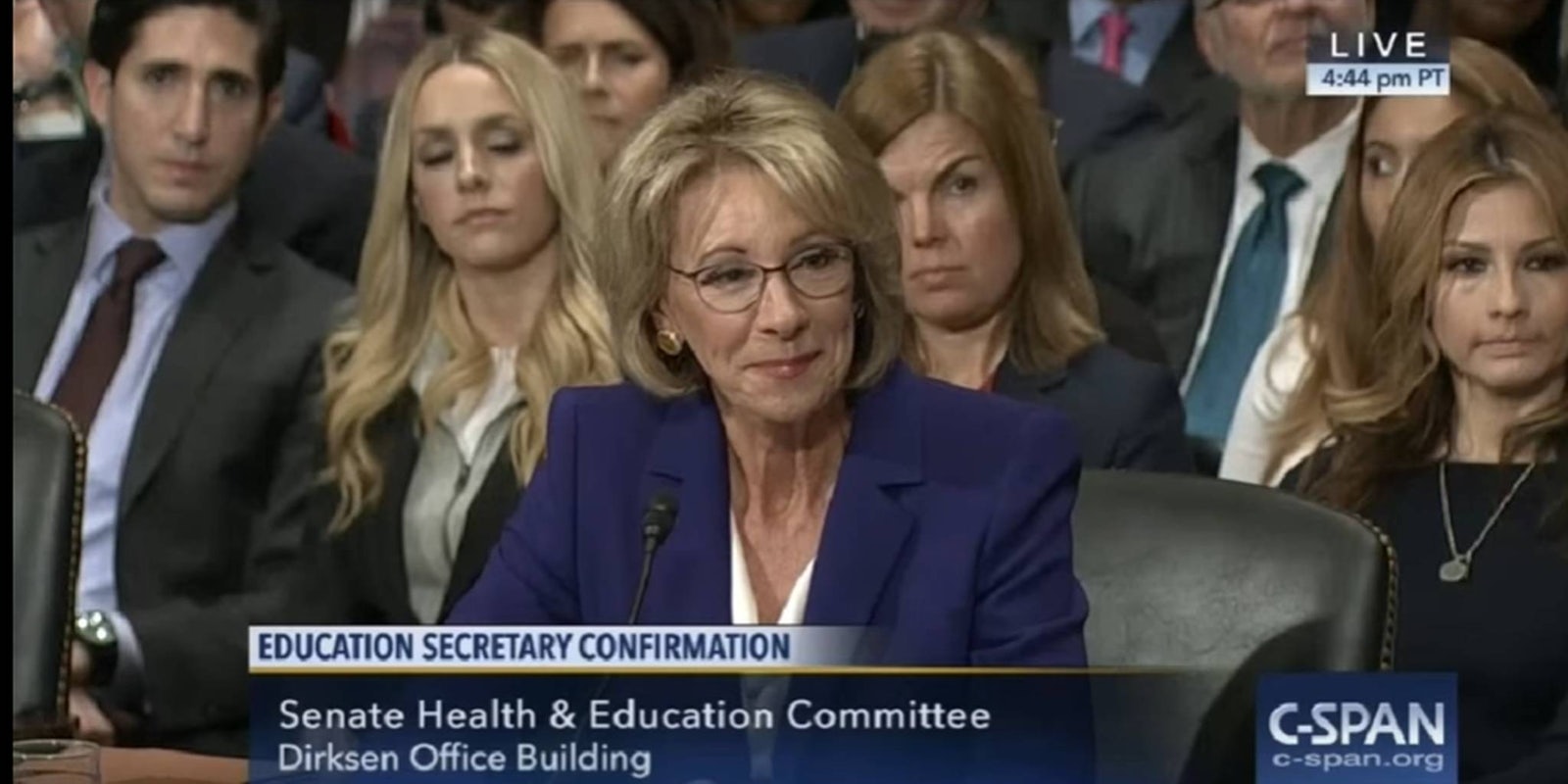President Donald Trump‘s education secretary nominee, Betsy DeVos, could soon make history—by failing.
If a single other Republican senator moves against DeVos’ confirmation, she will likely to be rejected by the full Senate next week. Were the Senate to vote down DeVos, it would be one of the few times in history that a president’s nominee lost a confirmation when his own party held a majority.
Republican Sens. Susan Collins of Maine and Lisa Murkowski of Alaska on Wednesday announced they were voting against DeVos’ confirmation.
Critics of DeVos, a Michigan billionaire and staunch school-choice advocate, say she will pose an existential threat to public schools if confirmed as education secretary. Public school teachers nationwide protested on the streets against DeVos, and school boards from New York State to Michigan wrote in opposition of the GOP donor.
Murkowski said on the Senate floor that she had heard from thousands of constituents in Alaska who opposed the nomination of DeVos, who has never attended a public school. Collins, meanwhile, stressed that she thought DeVos was a good person who genuinely cared about children. But the Maine senator was not at all convinced that DeVos was fit to lead America’s public school system.
“Like all of us, Mrs. DeVos is the product of her experience,” said Collins. “She appears to view education through the lens of her experience in promoting alternatives to public education in Detroit, and other cities where she has—no doubt—done valuable work.”
In fact, the East Lansing School Board on Tuesday passed a resolution in opposition to DeVos. Thousands attended a protest last weekend in Holland, Michigan, the town where DeVos grew up. The Michigan Education Association is opposed to DeVos and both Michigan senators plan to vote against her confirmation.
“DeVos is no stranger to Michigan educators and students who have suffered under policies pushed by her and her billionaire family’s contributions to Republican politicians for years,” wrote the Michigan Education Association in a statement. “Her support of unaccountable for-profit charter schools in Michigan has harmed children and communities.”
Collins said DeVos gave her reassurance that she would not mandate that states adopt school choice vouchers or alter federal funding to favor states with voucher programs. This was obviously not enough.
“I’m concerned that Mrs. DeVos’ lack of experience with public schools will make it difficult for her to fully understand, identify, and desist with those challenges, particularly for our rural schools in states like Maine,” said Collins.
Collins also took into account DeVos’ lack of familiarity with a federal law on disabled students. Children with disabilities have a right to free public education under a 1975 federal law known as the Individuals with Disabilities Education Act (or IDEA). When Sen. Tim Kaine (D-Va.) asked DeVos about IDEA, she replied that she felt it was “best left up to the states.”
In order for DeVos to be confirmed, she will need approval from a simple majority of senators. Not a single Democrat has said they will vote for the Republican heiress.
It is still unclear if other Republicans will join Murkowski and Collins in opposing Trump’s pick for education secretary.
Without Murkowski and Collins on board, that leaves a likely 50-50 vote for DeVos. If there is a tie, Vice President Mike Pence will cast the tie-breaking vote.
But Pence has very little reason to oppose DeVos. The former governor of Indiana hails from the state with the broadest voucher program in the country, with no cap on the number of vouchers it can grant students. DeVos has poured millions into Indiana politics and $1.7 million into an Indiana school-choice network between 2012 to 2014, according to the Indianapolis Star.
The Senate voted 52-47 to close the filibuster on DeVos’ nomination on Wednesday afternoon, with Collins and Murkowski agreeing to move her nomination to the floor. DeVos’ confirmation vote is expected later next week.


